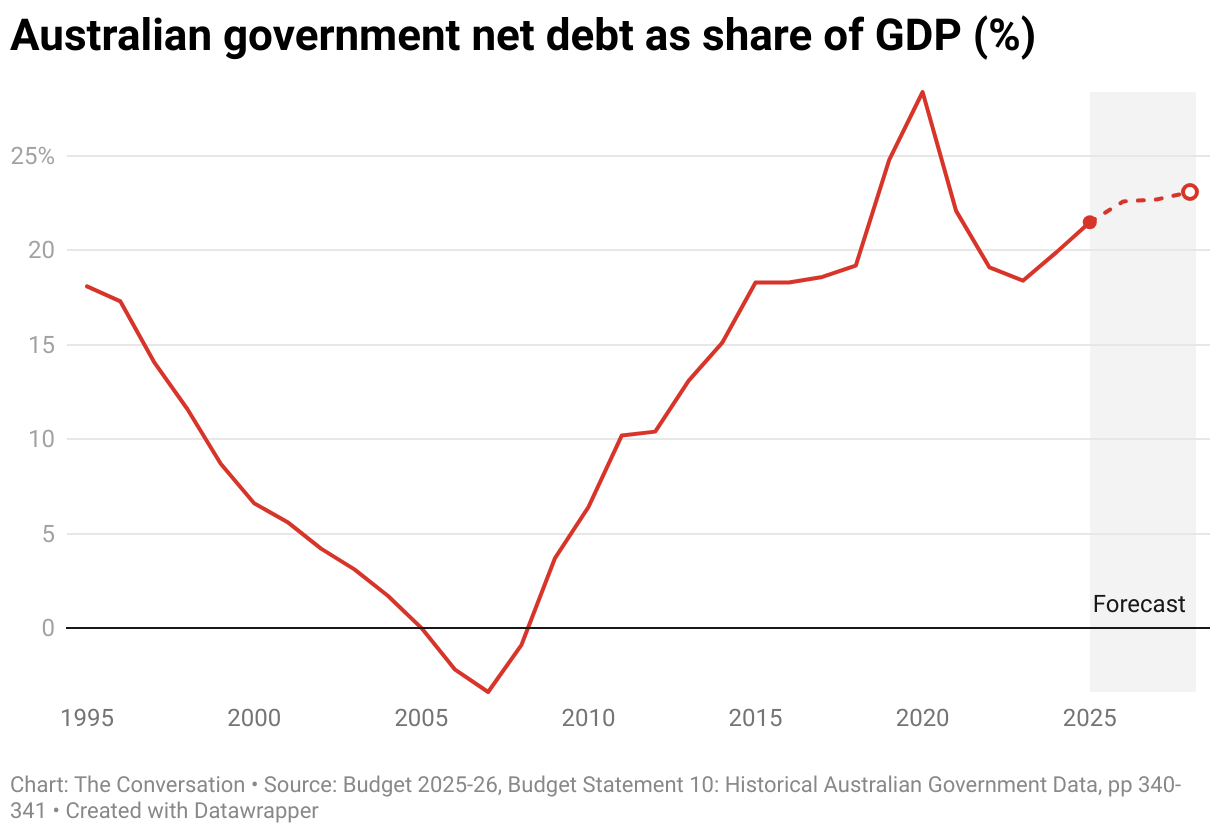Treasurer Jim Chalmers made budget sustainability one of the key pillars of the reform roundtable.
Concern that budget spending is on an unsustainable trend has been caused by rising government spending as a share of the economy. The spending has not been matched by an increase in tax revenue.
Government spending is forecast to increase further due to very high growth in National Disability Insurance Scheme (NDIS) spending, health and aged care, and a need for higher defence spending over time.
Budget, or fiscal, sustainability means that government debt as a share of the economy does not consistently increase. This is measured by the debt-to-gross domestic product (GDP) ratio.
Budget discipline improves the wellbeing of Australians by giving the government room to respond to economic shocks and ensures sustained provision of government services.
To keep government spending in check, stronger budget rules with numerical targets are needed. The treasurer’s roundtable is a good opportunity to consider such rules.
Why targets matter
Fiscal rules usually specify targets for ratios of government spending to GDP, and debt and deficits to GDP. All advanced economies have fiscal rules, as do 105 countries globally.
They were first used in Australia by then Treasurer Paul Keating in the 1985 "trilogy" commitments: that tax revenue to GDP would not increase; government expenditure to GDP would fall; and the size of the deficit would fall.

A legislative requirement for the government to specify fiscal targets was introduced by then treasurer Peter Costello in 1998 in the Charter of Budget Honesty.
Both Liberal and Labor governments since then have committed to several rules with numerical targets, such as spending to GDP, debt to GDP, or a commitment to balance the budget “over the (economic) cycle”.
The four budgets since October 2022 delivered by Chalmers have contained many general statements with good intentions, such as building fiscal buffers. But these are not targets that can be numerically tested and used to ensure the government keeps its promises.
The two numerically testable commitments in these four budgets are:
- “directing the majority of improvements in tax receipts to budget repair” (which has been met)
- “limiting growth in spending until gross debt as a share of GDP is on a downwards trajectory, while growth prospects are sound and unemployment is low” (which has not been met).
It’s time to test the treasurer’s claims
As the treasurer renews his focus on budget sustainability, now is the time to commit to precise rules that require the government to meet measurable targets and clear time frames (such as within the next three years) for:
- spending to GDP
- deficit and debt to GDP
- and, desirably, a cap on tax revenue to GDP.
These rules can play an important role in helping Chalmers and Finance Minister Katy Gallagher to argue against new spending proposals from their cabinet colleagues.
Having fiscal rules in place can also help show a government’s resolve and credibility in the event of a crisis in financial markets. This happened following the bond market crisis in the United Kingdom in 2022.
For the opposition, committing to these rules can show its capacity as an economic manager. They may be required by independents as one of the conditions to work with a minority government.
The role of the Parliamentary Budget Office
As it currently stands, there is no organisation that systematically holds the government to account against any fiscal targets.
The Parliamentary Budget Office (PBO) provides independent and nonpartisan analysis of fiscal policy. But it does not assess compliance.
Its remit should be expanded to include assessing the government’s compliance with fiscal rules. This occurs for many similar organisations internationally. Overseas research suggests that well-designed PBOs and similar bodies improve compliance with fiscal rules, and thus improve budget outcomes.
A stronger PBO could also make policy recommendations. There are many other examples of Australian independent government entities that make recommendations or decide on economic policy – notably the Productivity Commission, the Reserve Bank of Australia and the Net Zero Economy Authority.
A policy remit for the PBO therefore has several precedents and would allow the office to become an advocate for sound fiscal policy, just as the Productivity Commission advocates for microeconomic efficiency.
Put simply, a fiscal watchdog with real teeth would assist the treasurer in meeting the goal of fiscal sustainability.
Julian Pearce, Adjunct Lecturer in public finance, Griffith University and Ross Guest, Emeritus Professor of Economics (Griffith University) and Teaching Associate (University of Queensland), Griffith University
This article is republished from The Conversation under a Creative Commons license. Read the original article.